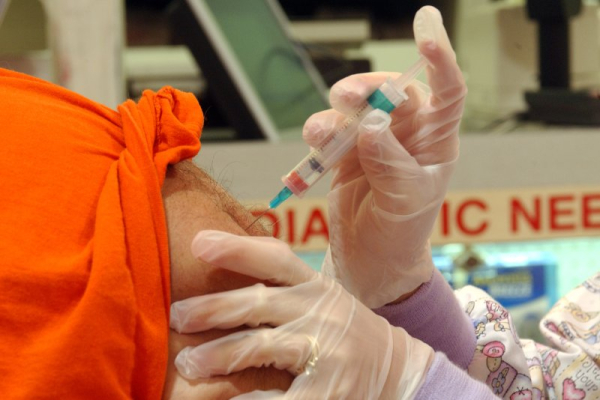Robert F. Kennedy Jr. signs panel’s decision to ban thimerosal.


A nurse gives an influenza virus vaccine shot to a man at a Giant Pharmacy in Fairfax, Va., on Oct. 13, 2004. File Photo by Roger L. Wollenberg/UPI | License Photo
The mercury-based preservative thimerosal will be removed from all flu shots distributed in the United States, Health and Human Services Director Robert F. Kennedy Jr. said Wednesday.
Kennedy made the change when he signed policies from the Centers for Disease Control and Prevention’s Advisory Committee on Immunization Practices, according to a news release Wednesday.
The committee voted 5-1 with one abstention for the changes at its meeting on June 25 and 26 in Atlanta. All people, including children, who receive a single dose of influenza will have them without mercury.
Kennedy, who hasn’t acted on other panel recommendations from June, signed the decision instead of the leader of the CDC. Susan Monarez, who is President Donald Trump’s nominee to head the agency, hasn’t been confirmed by the U.S. Senate.
The committee also voted 6-0 to recommend all Americans age 6 months and older to receive an annual influenza vaccine. Flu vaccines are reformulated yearly because viruses mutate and evolve.
Thimerosol was added to vials of vaccine that contain more than one dose to prevent the growth of germs, including bacteria and fungi. It was removed from children’s vaccines in the United States in 2001.
“After more than two decades of delay, this action fulfills a long-overdue promise to protect our most vulnerable populations from unnecessary mercury exposure,” Kennedy said in a statement. “Injecting any amount of mercury into children when safe, mercury-free alternatives exist defies common sense and public health responsibility. Today, we put safety first.”
In 1999, the U.S. Public Health Service, the American Academy of Pediatrics and vaccine manufacturers agreed that any potential risk from mercury warranted removal as soon as possible.
The advisory panel didn’t act until Kennedy appointed new members in June to approve the changes, which was recommended by the European Medicines Agency in 2004.
The eight committee members include some vaccine skeptics and pandemic response critics.
The panel heard a presentation against thimerosal from Lyn Redwood, the former leader of Children’s Health Defense, an anti-vaccine group founded by Kennedy.
Redwood is listed as an “expert” on the HHS employee website.
In the news release, vaccine manufacturers said they have the capacity to fill vials without mercury.
“With the U.S. now removing mercury from all vaccines, we urge global health authorities to follow this prudent example for the protection of children worldwide,” Kennedy said.
The removal affects 4% to 5% of the flu vaccine supply in the U.S., CNBC reported.
Multi-doses from Sanofi’s Fluzone and two shots from CSL Sequirus included thimerosal. The other flu shots were free from it, according to the CDC.
“We acknowledge the recommendation of the new Advisory Committee on Immunization Practices (ACIP),” Sanofi said in a statement to The Hill. “We will have sufficient supply of Sanofi flu vaccine to support customer preference for this season.”
The most common side effects from thimerosal in vaccines were red and swelling at the injection site with some people allergic to it, according to the CDC.
In a book by Kennedy in 2014, he wrote thimerosal was “toxic to brain tissue” and likely caused autism.
A 2010 CDC study found “that prenatal and infant exposure to vaccines and immunoglobulins that contain thimerosal does not increase risk for autism spectrum disorder.”
In all, more than 40 studies over several decades showed no connection between thimerosol and developmental delays.
Flu shots for the 2025-2026 flu season are available starting in August.